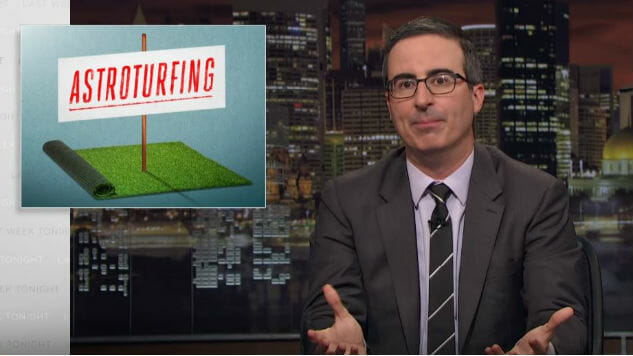John Oliver Hates Astroturf (No, Not That Kind)
Image via HBO/YouTube
John Oliver took a strong stance against astroturf on Sunday night’s episode of Last Week Tonight—well, less so astroturf in the Jetsons sense and more like astroturfing, a practice Oliver described as when “corporations and political groups disguise themselves as spontaneous authentic popular movements.” In other words, corporations establish fake grassroots campaigns to manipulation regulation, legislation and public opinion to their benefit, and it’s about as bad as it sounds.
Astroturfing campaigns usually exist as organizations that are just vaguely titled enough to be incredibly misleading. As Oliver points out, Save Our Tips is actually an anti-minimum wage interest group funded by restaurant owners, The National Wetlands Coalition worked for oil companies and real estate developers, and the American Council of Science and Health is backed by fracking interest groups, e-cig and soda companies and—because what’s a little more fuel for this dumpster fire?—chemical companies, too. Essentially, the companies that buy large blocks of airtime for attack ads can secure total anonymity for the causes they support by running their money through non-profit organizations that don’t have to disclose information about their donors. The moral of the story? To paraphrase Kurt Vonnegut, “Nothing is beautiful and everything hurts.”
Aside from attack ads, astroturfing organizations frequently use spokespeople to back their causes. In some cases, the organizations pay an expert to testify on their behalf; Oliver cites a burn surgeon who was paid $240,000 to represent the Citizens for Fire Safety and speak out against regulation of the carcinogenic chemicals in flame-retardant furniture. As it turns out, the political group only had three members, who just happened to be the world’s three largest makers of flame retardant. The burn surgeon made up stories about infant patients dying of burn wounds, and the bill against the chemicals was later struck down.